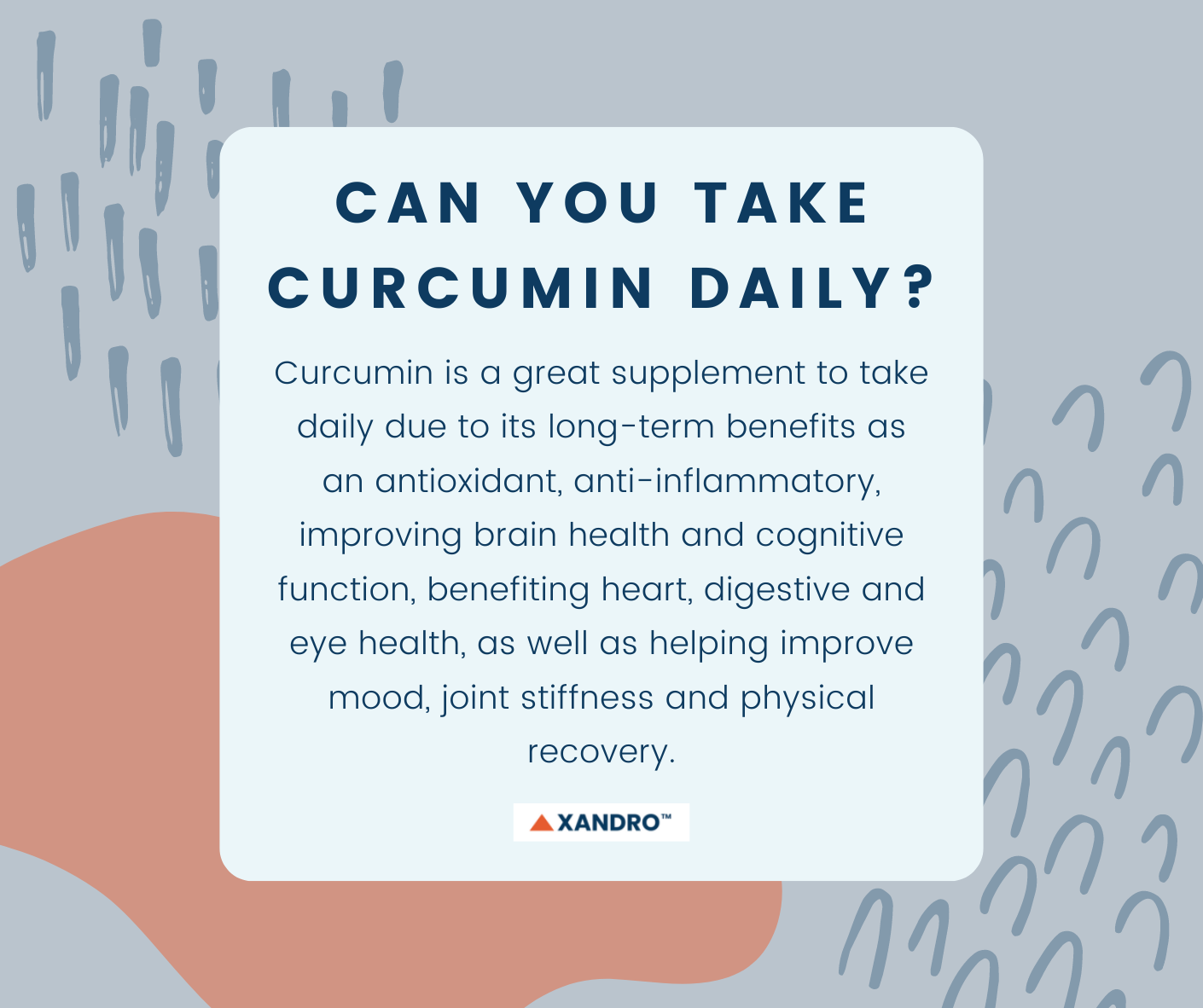Unlocking the Top Health Benefits of Curcumin Supplements: What You Need to Know
7th May 2024
Top Benefits of Curcumin Supplements
Most of us have heard of turmeric. It’s a spice that has been used for centuries for its medicinal benefits, but did you know its active ingredient is called curcumin?
This compound is a strong antioxidant and has anti-inflammatory effects — two of the benefits we’ll mention below — but it’s so much more than that.
This article will cover various topics, so click the links below to jump there now.
- What are the Main Benefits of Curcumin?
- All About Curcumin Supplements
- Who Should Take Curcumin Supplements?
- Who Should Avoid Curcumin?
- FAQs about Curcumin
Antioxidant
Curcumin is a strong antioxidant. Antioxidants can neutralise free radicals (unstable molecules that damage cells, contributing to the development of chronic diseases like heart, disease, Alzheimer’s disease and cancer) and protect our cells from oxidative damage. This is thought to be one of the reasons for aging, so it’s important to include antioxidants in your diet.
Anti-inflammatory
Another great benefit of turmeric supplements is that they can help with inflammation. Curcumin has anti-inflammatory effects, which is great since inflammation in the body has been linked with various chronic diseases, such as chronic pain, inflammatory bowel disease and arthritis. Studies have shown that a 1,500mg daily dose of curcumin extract was as effective as a daily 1,200mg dose of ibuprofen, but without giving you the gastrointestinal side effects.
Can turmeric burn belly fat? Curcumin can help with weight loss as it has been linked with a reduced body index, body weight and weight circumference in adults with PCOS, metabolic syndrome and non-alcoholic fatty liver disease. Due to its benefits as an antioxidant and anti-inflammatory, it helps boost body metabolism, which helps with fat and calorie burn.
Is curcumin good for skin? As an anti-inflammatory, curcumin may also help wounds heal more quickly, as well as positively affect tissue and collagen.
Neuroprotection
Various scientific studies have shown that curcumin also has neuroprotective effects by protecting brain cells and nerve connections from damage, potentially helping prevent and treat neurodegenerative diseases, such as Alzheimer’s disease, Parkinson’s disease and multiple sclerosis. This means it can help with our brain health.
Mood
Curcumin may help boost serotonin and dopamine, which help improve your mood, as well as ease depression and anxiety.
Exercise Performance
Curcumin can also improve our physical function and then alleviate any muscle tiredness and soreness after we exercise. Along with this, it can also delay muscle soreness and treat inflammation after exercise, making it a fantastic supplement for muscle recovery. Curcumin may also improve skeletal muscle function after extreme exercise.
Autoimmune Protection
Did you know that there are more than 120 human clinical trials showing the effects of curcumin in treating a range of diseases, from autoimmune ones to Alzheimer’s disease? Curcumin improves our gut bacteria, which keeps our overall immune system healthy. It's also a great longevity supplement. Curcumin has also been shown to relieve mild joint stiffness! It can help regulate the immune system, helping with rheumatoid arthritis, lupus and psoriasis. It can also block cytokines that cause autoimmune diseases.
Eye Health
Curcumin has been shown to help eye health by protecting against age-related macular degeneration as well as cataracts. It has been found to reduce ROS and block apoptosis by blocking inflammation as well as delay structural defects in genes that cause other eye issues.
Oral curcumin can also improve uveitis, showing results comparable to corticosteroid therapy, as well as potentially improving glaucoma, diabetic retinopathy and eye floaters.
Heart Health
Turmeric capsules may help lower cholesterol levels, improve blood flow, lower blood pressure and overall protect against heart disease.
Digestive Health
Curcumin benefits your digestion and can reduce inflammation in your gut, especially for those with irritable bowel syndrome and Crohn’s disease. Due to its ability to block cytokines, it can help gut health by improving our gut bacteria.

As Curcumin generally isn’t absorbed well, supplements are recommended. Curcumin supplements come as turmeric powder, capsules and tea.
So, Curcumin vs Turmeric?
Since turmeric is only made of around 3 to 6 per cent of curcumin, it’s best to take a curcumin supplement, especially since the studies on this compound used doses between 500 to 2,000mg per day — you would need to consume large amound of turmeric!
Another important question to ask is, ‘What is the Most Effective Form of Curcumin?’
As with any supplement, make sure the curcumin is of high quality. With curcumin in particular, though, for it to be effective, it’s important to take patented and clinically verified curcumin. This is because curcumin is hard for our body to absorb, so if you’re not taking a form that is bioavailable, you’re simply flushing it out when you go to the bathroom.
For example, Xandro Lab’s Turmeric Curcumin is made of patented BCM-95® turmeric curcumin. This is made by combining curcumin with 100 per cent turmeric extract to increase its absorption into the body. BCM-95® has been clinically verified to be more bioavailable than other curcumin extracts, even those that are combined with pepper (a way to enhance the absorption of curcumin). It’s also been shown to last in the bloodstream even after eight hours, so it’s definitely a fantastic form of curcumin to take.
What is the Recommended Dosage of Curcumin?
There is no set dosage of curcumin at this stage, but it’s generally recommended to take between 500 and 2000mg per day. No toxicity has been found when taking up to 8000mg for up to three months.
For exercise performance, studies have suggested that a 2–5 day supplementation of high dose curcumin (2 x 500 to 2500mg per day), or taking a hybrid product giving you around 200 to 1000mg of curcuminoids per dose before exercise is great for recovery benefits.
What is the Best Time to Take Curcumin?
It’s best to take curcumin capsules in the morning or at lunch, preferably within three hours before or after your meal. Keep in mind that it might interfere with your sleep if you take it at night.
How to Take Curcumin?
For curcumin supplements, take one capsule each day, or follow what’s on the bottle.
Is it Good to Take Curcumin Daily?
So, what happens to your body when you take turmeric every day? Well, it’s definitely a supplement that’s great to take every day. As mentioned below, there are certain people who should speak to their doctor before taking curcumin, however, for everyone else, its benefits as an antioxidant, improving cognitive function and brain health, as well as heart, digestive and eye health are great long-term reasons to take curcumin daily.
For benefits in everyday life, curcumin helps promote a healthy mood balance, relieves mild joint stiffness, enhances physical function and helps remove joint stiffness and soreness after exercise. Turmeric benefits sexually, too, helping increase testosterone.

Does Curcumin Work Immediately?
Expect to see results from curcumin after at least 4 to 8 weeks since it takes time to build up in your system.
- Antioxidant effects: Typically, antioxidant benefits become noticeable within 4 to 8 weeks, as seen in studies conducted on animals and in clinical settings.
- Digestive benefits: Improvement in digestion may become apparent within 8 to 12 weeks of regular curcumin consumption.
- Exercise recovery: Curcumin shows promise in reducing exercise-induced joint discomfort, with a daily intake of 1,000mg showing promise in reducing osteoarthritis symptoms, similar to the effects of ibuprofen. These were seen after 8 to 12 weeks.
- Cognitive benefits: A study found that healthy older adults experienced enhanced working memory and mood after four weeks of daily turmeric supplementation.
While curcumin absorption in older adults can occur as quickly as within an hour of supplementation, the timeline for noticing significant benefits varies based on individual factors such as age, health status, weight and dosage.
Turmeric benefits for women and turmeric benefits for men are the same, equally benefiting everyone. As mentioned in the benefits above, you should benefit from taking curcumin supplements if you have:
- Inflammation
- Stress
- Cognitive problems
- An autoimmune disease
- A cardiovascular disease
- Digestive health problems
- Eye problems
Always speak with your medical professional before taking any supplements and always start with a lower dosage and gradually increase it to allow your body time to get used to it.
While it’s considered a safe nutritional supplement to take, there are some potential side effects of curcumin. This includes diarrhoea, headache, dark urine, nausea, vomiting, yellow stool, yellowing skin and eyes and rash.
Always stick to the recommended dosage on the bottle as an excessive amount of curcumin can lead to digestive issues.
What about, ‘What to avoid when taking curcumin?’
Don’t take curcumin if you’re on anti-coagulants (blood thinners), such as warfarin, clopidogrel and aspirin as it may enhance their blood thinning effects. Likewise, avoid curcumin if you take drugs that affect your blood sugar levels or if you have or have had liver problems.
End Note
Don’t just take our word for it. Many well-known physicians and health experts use turmeric curcumin supplements, such as Dr. Andrew Weil, Dr. Mercola and Deepak Chopra.
Looking for the best curcumin supplements? Try out Xandro Lab’s BCM 95® Turmeric Curcumin 400mg supplement. This turmeric supplement Singapore is a convenient, highly bioavailable form of curcumin, meaning you should actually be able to improve your curcumin levels and potentially see benefits. Click the link to see what our customers have to say!
Does Ginger Contain Curcumin?
Ginger does not contain curcumin; rather, curcumin is a compound found in turmeric, which is a different spice altogether. Curcumin is known for its anti-inflammatory and antioxidant properties.
Does Curcumin Thin Blood?
Curcumin is sometimes associated with blood-thinning effects, as it can prevent blood clotting. Always speak with your medical professional before adding curcumin supplements into your routine, especially if you're already taking blood-thinning medications or have any underlying health conditions.
Does Curcumin Lower Blood Pressure?
Some studies suggest that curcumin may have a modest effect on lowering blood pressure, mainly due to its anti-inflammatory and antioxidant properties.
Does Curcumin Interact with Any Medications?
Curcumin may interact with certain medications, particularly blood thinners like warfarin (Coumadin) or antiplatelet drugs like aspirin. It can also potentially interact with medications metabolised by the liver.
